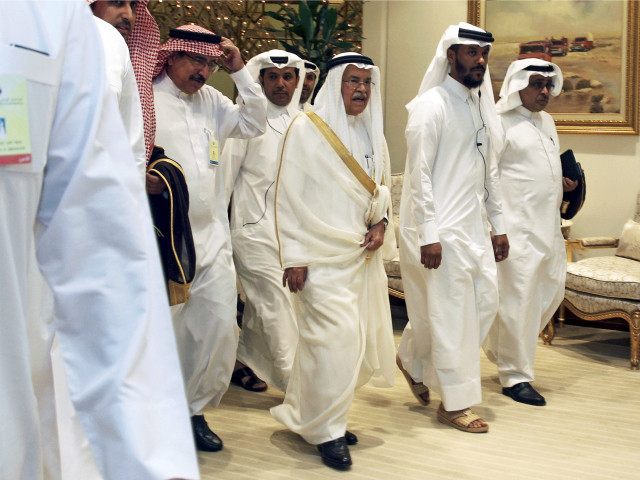The rally in oil prices over the past few weeks was based on hopes that oil-producing nations would agree to freeze production at a pivotal meeting in Doha, Qatar, but the talks collapsed without an agreement on Sunday.
According to the Wall Street Journal, the problem was a “surprising” demand by Saudi Arabia for a cap on Iranian oil production.
“Saudi Arabia’s position that Iran join the freeze or there would be no deal scuttled the discussions before they started, participants said, and the meeting descended into sniping and confusion,” the Journal reports.
Some of the Saudi officials in the Doha delegation were willing to consider a freeze that did not conclude Iran, but early Sunday morning they received a call from Riyadh instructing them to back out of any deal that did not include the Iranians.
This was seen as a significant shift of power from longtime Saudi oil minister Ali al-Naimi to deputy crown prince Mohammed bin Salman, who now appears to be the ranking authority on economic policy in the Kingdom.
Reuters sees the Saudi move in the context of rising regional tensions with Iran, noting that the Doha meeting included some “fierce debate” between the Saudis and Iran’s patron Russia, one of the non-OPEC nations represented at the talks. Russian oil minister Alexander Novak declared the Saudi demand for Iranian participation “unreasonable.” Iran did not have a representative at the meeting.
The Iranians have refused to stabilize oil production because they are determined to regain market share lost to the international sanctions that ended with Barack Obama’s nuclear deal. The Saudis knew this going into the meeting, but there is speculation they were banking on Iran to communicate some willingness to negotiate through the Russians, or perhaps Saudi officials underestimated how firmly the monarchy would refuse to settle for an agreement that did not include Iran.
Bloomberg News quotes one analyst who believes Saudi oil policy is now being driven largely by their geopolitical conflict with Iran, and another who notes the Saudis could be worried about the difficulty of regaining lost market share ceded in a production freeze to stabilize a bear market.
With the Doha summit in shambles, the Saudi-Iranian feud over oil is likely to grow even more heated. In fact, Reuters reports the Saudis have actually threatened to increase oil output, which would drive prices even lower.
Oil dropped below $30 a barrel in January and rallied up to $43 a barrel when there was hope a production freeze would come out of Doha. The Saudis have said in the past they would be willing to accept $20 oil.
The Financial Times reports oil prices began sinking promptly after talks in Qatar ended without a deal, with crude oil down by as much as 7 percent in Monday morning’s Asian market.
Bloomberg News reports “futures fell 2.9 percent in New York, paring an earlier loss of 6.8 percent — the biggest decline in two months.”
“The whole world was waiting for this to happen. We were all positive this morning. If it doesn’t, this is not good,” one of the Doha delegates said on Sunday.
With the possibility of a production freeze looking remote, the Financial Times sees only two significant factors on the horizon to bring oil prices back up: a substantial decrease in U.S. shale oil production this year, and a strike by Kuwaiti oil workers that began on Sunday.

COMMENTS
Please let us know if you're having issues with commenting.